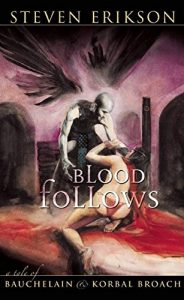 There is one problem with publication order, and that problem is when small run publications are later gathered into collections. Well, to be fair, it’s not a problem with reading; you just read the part of the book that contains the story you were reading in publication order, and then put it down until later. But it is a problem for me specifically, since I include links to the book I read from, and yet the book I read Blood Follows in is not strictly the original book itself, since it’s a collection. Like, it’s fine now, but what about when I have the same cover and the same link for the next story I read from this collection? (It turns out I used the cover of the original small batch publication, so that may help a little.)
There is one problem with publication order, and that problem is when small run publications are later gathered into collections. Well, to be fair, it’s not a problem with reading; you just read the part of the book that contains the story you were reading in publication order, and then put it down until later. But it is a problem for me specifically, since I include links to the book I read from, and yet the book I read Blood Follows in is not strictly the original book itself, since it’s a collection. Like, it’s fine now, but what about when I have the same cover and the same link for the next story I read from this collection? (It turns out I used the cover of the original small batch publication, so that may help a little.)
(It’s possible[1] I’m thinking about this too much.)
So, in Memories of Ice, one of the subplots I did not mention was that of the necromancers Bauchelain and Korbal Broach. This is because despite touching on the main drive of the story at several points, they really have nothing to do with anything that’s going on. Despite that, they are fascinating characters. Well, the one who murders people and uses their parts to build constructs in pursuit of some nebulous goal that may not rightly exist[2] is not especially fascinating. But the one who accompanies and protects the crazy one because it gives him a chance to further his own necromantic research, and who presents as a polished and urbane yet evil supergenius in the vein of Dr. Doom, he is fascinating. And their manservant, Emancipor Reese, is usually played for comic relief, but in a way that makes you care about him. He’s stuck in a situation, and making the best of it. (Well, trying and mostly failing to, whence comes the comedy.)
Anyway, though, Blood Follows. This is a short book that gives an answer for why these characters were in the main sequence book: because Erikson is as fascinated by them as I am. We join our characters several years earlier and half a world away. Emancipor Reese has just lost another in a long string of employers to unfortunate death (this time at the hands of a murderer stalking the streets of his city for the past fortnight), and he needs to find a new job fast, lest his wife and probably non-biological children think even less of him than they already do. Also, there’s a reasonably cool police detective type trying to solve the murders.
By and large, this is a story that you will care about if you care about the characters you already knew, and otherwise, you will not. In part this is because Erikson is a far worse mystery novelist than he is a fantasy and war novelist. In part, it’s because even to the extent that the mystery worked, too many characters emerge as major players in the final act, and it is seen through the eyes of someone who has just as little idea of what’s going on as the reader does. This can work in the first book of an epic series, if your reader trusts you and in the meantime the story is written masterfully. It works a lot less well when the story is barely a hundred pages long and the things the reader didn’t really understand revolved around characters he (by which I mean I) doesn’t really expect to encounter ever again.
This isn’t to say I didn’t like it. It is to say that if I wasn’t already invested in the world and the main characters, I probably would not have, though.
[1] probable
[2] That is, I don’t really think he has an endgame in mind (nor that, even if he does, I’ll ever learn it). It’s more like he’s playing with legos to see what he can make.
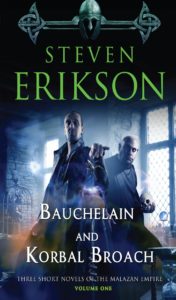 So yay, I finally finished my Malazan short novels collection, which you may remember (although, notably, I did not) I wasn’t so sure about continuing, because of a certain moral brokenness to the second story. So, good news: the third story was not like that. (Bad news: since I read those two out of order, I can’t consider the trendline broken.)
So yay, I finally finished my Malazan short novels collection, which you may remember (although, notably, I did not) I wasn’t so sure about continuing, because of a certain moral brokenness to the second story. So, good news: the third story was not like that. (Bad news: since I read those two out of order, I can’t consider the trendline broken.)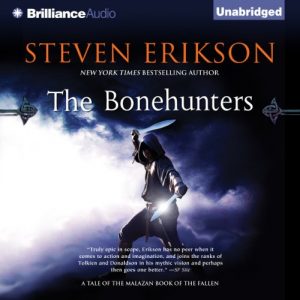 Jesus, I read
Jesus, I read 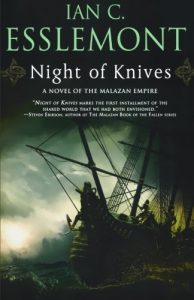 This is where the Malazan books get logistically weird. Because, see, Erikson had a fellow gamer partner back in the early ’80s or whenever they were building this world, which is ultimately my point, that the world builder behind the Malazan books is a they. And apparently the dividing line they have drawn is that Erikson writes about the Malazan Empire in decline[1], whereas Ian Esslemont writes about the Malazan Empire in ascension. Well, he does eventually. In a trilogy written later than this one.
This is where the Malazan books get logistically weird. Because, see, Erikson had a fellow gamer partner back in the early ’80s or whenever they were building this world, which is ultimately my point, that the world builder behind the Malazan books is a they. And apparently the dividing line they have drawn is that Erikson writes about the Malazan Empire in decline[1], whereas Ian Esslemont writes about the Malazan Empire in ascension. Well, he does eventually. In a trilogy written later than this one.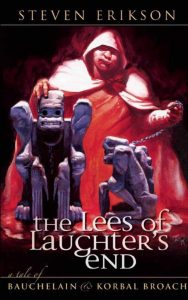 Well, this is incredibly annoying.
Well, this is incredibly annoying.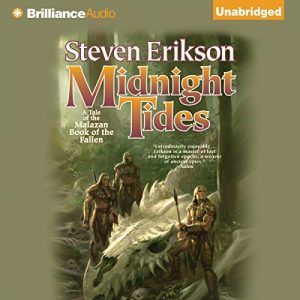 I feel like I have been listening to
I feel like I have been listening to 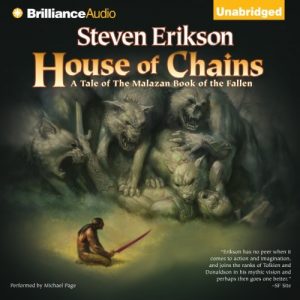 It is hard to believe that
It is hard to believe that  There is one problem with publication order, and that problem is when small run publications are later gathered into collections. Well, to be fair, it’s not a problem with reading; you just read the part of the book that contains the story you were reading in publication order, and then put it down until later. But it is a problem for me specifically, since I include links to the book I read from, and yet
There is one problem with publication order, and that problem is when small run publications are later gathered into collections. Well, to be fair, it’s not a problem with reading; you just read the part of the book that contains the story you were reading in publication order, and then put it down until later. But it is a problem for me specifically, since I include links to the book I read from, and yet 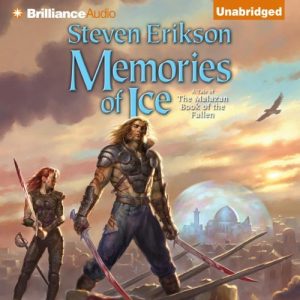 My original review of
My original review of 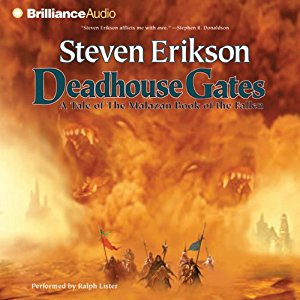 It has been a stupidly long time since I finished listening to
It has been a stupidly long time since I finished listening to 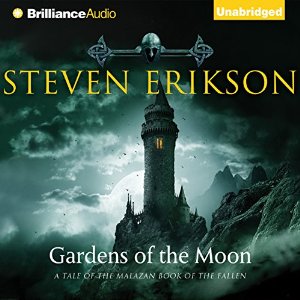 First thing: I’ve read
First thing: I’ve read